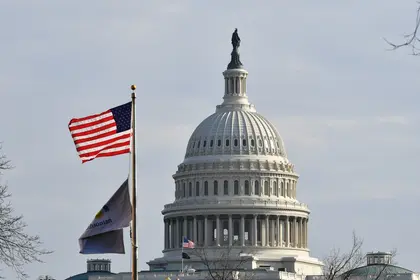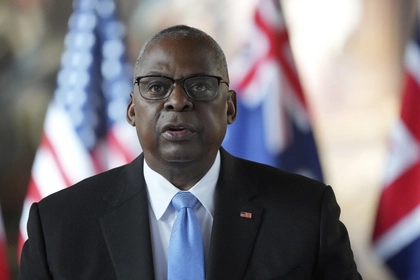The US has avoided a painful holiday season government shutdown by passing a stop-gap funding bill on Wednesday evening, though the deal omits aid for Ukraine and Israel requested by President Biden.
With three days to go before the Friday night deadline, the Senate voted to keep the lights on through mid-January with a resolution that had advanced from the House of Representatives during a week of high-stakes brinkmanship on Capitol Hill.
JOIN US ON TELEGRAM
Follow our coverage of the war on the @Kyivpost_official.
Democrats had pressed for the inclusion of aid for Israel, Ukraine and Taiwan -- but each now looks set to be dealt with separately, with a $61 billion request from the White House for Kyiv looking particularly precarious amid conservative opposition, AFP reports.
Senate Majority Leader Chuck Schumer said the bill was “far from perfect” but achieved Democrats' aims of keeping the lights on without "cruel cuts or poison pills."
The last-ditch “continuing resolution (CR)” was pitched by new House Speaker Mike Johnson as more than a million public workers looked set to be sent home unpaid ahead of next Thursday's Thanksgiving holiday, upending government functions from national parks and air traffic control to federal policymaking.
The shutdown crisis was triggered by hardline conservatives in the Republican-led House defying their own party leadership to scupper the bills that normally set the annual federal budget as they pressed for deep spending cuts.

US-Ukraine Relations: Where Do Trump and Harris Stand?
House Republicans needed help from Democrats to overcome a rebellion on the right to advance the bill, which essentially puts off budgeting until January of 2024 – a presidential election year.
The measure includes none of the policy priorities or drastic cuts the Republican right flank was pushing for, and conservatives put Johnson on notice that they would not accept another stop-gap at current spending levels.
“We're done with the failure theater here in Congress — we're not just going to pass bills that don't address the problems that Americans face,” said Scott Perry, chairman of the hard right House Freedom Caucus.
Budget votes in Congress regularly turn into a standoff, with one party using the prospect of a shutdown to seek concessions from the other, usually without success.
This one was seen as Johnson's first major leadership test, after allies of former president Donald Trump, furious that their leadership had reached a deal with Biden to extend funding, successfully moved to oust Johnson's predecessor Kevin McCarthy in October.
The historic rebellion left the lower chamber paralyzed for three weeks as Republicans struggled to find a replacement leader, even as the deadly Hamas attack on Israel and war in Ukraine spurred calls for quick congressional action.
“At this point, it's important for the Congress to come together, Democrats and Republicans, on a bipartisan path forward to fully funding the government,” Democratic House Minority Leader Hakeem Jeffries told reporters.
“It should be obvious to anyone who is watching that House Republicans are unable to govern on their own. Period, full stop, no further observation necessary.”
There have been no shutdowns so far under Biden, although Trump saw two, including a 35-day shutdown five years ago that was the longest in US history.
You can also highlight the text and press Ctrl + Enter






